|
|
|
Sort Order |
|
|
|
Items / Page
|
|
|
|
|
|
|
| Srl | Item |
| 1 |
ID:
163307
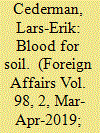

|
|
|
|
|
| Summary/Abstract |
Since the French Revolution, nationalism—the idea that state borders should coincide with national communities—has constituted the core source of political legitimacy around the world. As nationalism spread from western Europe in the early nineteenth century, it became increasingly ethnic in nature. In places where the state and the nation did not match up, such as Germany, Italy, and most of eastern Europe, the nation tended to be defined in terms of ethnicity, which led to violent processes of unification or secession. At the beginning of the twentieth century, ethnic nationalism came to disrupt political borders even more, leading to the breakup of multiethnic empires, including the Habsburg, Ottoman, and Russian ones. By changing the size of Europe’s political units, this undermined the balance of power and contributed to two world wars
|
|
|
|
|
|
|
|
|
|
|
|
|
|
|
|
| 2 |
ID:
082683


|
|
|
|
|
| Publication |
2008.
|
| Summary/Abstract |
Whilst there has been a proliferation of research on the role of nationalism in the exclusion of asylum seekers, less attention has been paid to how nationalism can be mobilised in accounts opposing, rather than supporting, harsh anti-asylum seeker regimes. This paper compares the ways in which 'Australia' is constructed and used in parliamentary speeches on asylum seekers by both refugee advocates and those seeking harsher asylum seeker laws in Australia. This dual focus is particularly important as it highlights the flexibility of nationalist discourse, in that the same constructions of the nation may be used for both exclusive and inclusive purposes. Whilst typologies of inclusive and exclusive nationalisms, such as Smith's (1991) ethnic/civic typology, focus on the content of nationalist ideologies, we argue that the inclusivity or exclusivity of nationalism can best be determined by examining the subject positions, political solutions and social realities they make possible, and who these discourses benefit and oppress.
|
|
|
|
|
|
|
|
|
|
|
|
|
|
|
|
| 3 |
ID:
108932


|
|
|
|
|
| Publication |
2011.
|
| Summary/Abstract |
This article examines the emergence of a neo-Biafran movement, known as, the Movement for the Actualization of the Sovereign State of Biafra (MASSOB) in Nigeria. Drawing on a prior idea of statehood, the advent of MASSOB marks a shift in the tenor of ethnic nationalism by virtue of the fact that the movement entirely rejects a state-led process and demands the creation of an independent state of "Biafra." The analysis dissects the change in the tempo of contemporary Igbo nationalism and identifies the need for a major restructuring of the Nigerian state in order to forestall the possibilities of other ethno-nationalist claims becoming uncompromisingly separatist.
|
|
|
|
|
|
|
|
|
|
|
|
|
|
|
|
| 4 |
ID:
190685
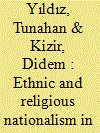

|
|
|
|
|
| Summary/Abstract |
This article compares the ideas of Hüseyin Nihal Atsız and Seyyid Ahmet Arvasi, two iconic ideologues of ethnic and religious nationalism in Turkey, respectively, on the issues of history, identity, and national ideal. It first argues that Atsız mainly presents a history of Turkish supremacism whereas Arvasi embraces a method of Islamization to remember history. It also demonstrates that Atsız tends to equate the racial and the national while Arvasi uses Islamic legitimacy for Turkish identity and nationalism. It is also evident that while Atsız offers classical pan-nationalism, Arvasi shows third-worldist and universalistic tendencies in defining Turkish destiny.
|
|
|
|
|
|
|
|
|
|
|
|
|
|
|
|
| 5 |
ID:
099527
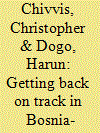

|
|
|
| 6 |
ID:
111489


|
|
|
|
|
| Publication |
2012.
|
| Summary/Abstract |
This article brings the thought of Giuseppe Mazzini back into the field of nationalism studies, from which it has been largely missing for a half century. It suggests the following: that Mazzini is much more modern and secular than he is usually portrayed; and that his commitment to liberal policies while rejecting liberal principles suggests that the distinction between civic and ethnic nationalism has been misconceived. Nationalism, to Mazzini, was not an end in itself but a means to an end - government of, by and for the people. The demand for such a government was manifested in three popular demands in nineteenth-century Europe: in the West as democracy, in the East as national sovereignty (the precondition for democracy) and in both East and West as social democracy. Thus nationalism may be instrumental rather than an end in itself, and it may be attributable not to ethnic groups' natural striving for autonomy but to the pursuit of democracy.
|
|
|
|
|
|
|
|
|
|
|
|
|
|
|
|
| 7 |
ID:
064411


|
|
|
| 8 |
ID:
020982
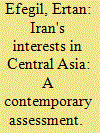

|
|
|
|
|
| Publication |
2001.
|
| Description |
353-365
|
|
|
|
|
|
|
|
|
|
|
|
|
|
|
|
| 9 |
ID:
107593
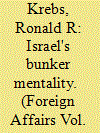

|
|
|
|
|
| Publication |
2011.
|
| Summary/Abstract |
The greatest danger to Israel comes not from without -- in the form of Palestinian intransigence -- but from within. The ongoing occupation of the territories is destroying Israel's values and viability. It breeds an aggressive, intolerant ethnic nationalism and causes political gridlock, empowering an ultrareligious underclass that refuses to contribute and lives off the state.
|
|
|
|
|
|
|
|
|
|
|
|
|
|
|
|
| 10 |
ID:
082678


|
|
|
| 11 |
ID:
123764
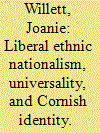

|
|
|
|
|
| Publication |
2013.
|
| Summary/Abstract |
Within the liberal paradigm, ethnic nationalism and identity are often conceptualized as 'exclusive', lacking the capacity for universal membership (Ipperciel 2007; Kohn 1946; Kymlicka 1995), and is juxtaposed against 'inclusive', civic forms of identity. This article problematizes this claim, asking whether civic territorial identities also contain their own forms of exclusion. Using the New Regionalism and the identity politics of contemporary economic development, this article explores civic/ethnic identities in Cornwall in the context of Agnew's (2005) observations about contemporary liberal values. The article finds that, in Cornwall, civic forms of territorial identity that distance themselves from ethnic Cornishness are more exclusive than contemporary ethnic nationalism in the region, introducing economic rather than ethnic exclusions. This raises questions about why ethnic identity can be negatively characterized in regional development discourses and what the effects of this might be.
|
|
|
|
|
|
|
|
|
|
|
|
|
|
|
|
| 12 |
ID:
117932
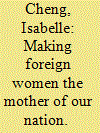

|
|
|
|
|
| Publication |
2013.
|
| Summary/Abstract |
Citizenship awarding is politicised. Conceiving female marriage migration as a national threat, Taiwan's citizenship legislation is consciously designed and purposefully utilised to achieve exclusion and assimilation. Driven by a nationalistic impetus, it shows how Taiwan imagines itself as a modern, prosperous and homogenous nation and projects upon the immigrant outsiders as a threat to its self-identity. Examined through immigrant women's lived experiences, this citizenship legislation is biased by gender, class and ethnicity. The implementation of the legislation is not only an example of symbolic politics but also banal nationalism realised at grassroots level in the private domain. Immigrant women's lived experiences show that exclusion and assimilation stemmed from banal nationalism is not just an operation of symbolic politics but is also enmeshed with their everyday life.
|
|
|
|
|
|
|
|
|
|
|
|
|
|
|
|
| 13 |
ID:
055140


|
|
|
| 14 |
ID:
122376
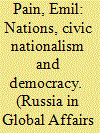

|
|
|
|
|
| Publication |
2013.
|
| Summary/Abstract |
Ethnic nationalism cannot be a strategic ally of the forces interested in Russia's modernization. Realizing the impossibility of a purely elitist modernization, these forces will inevitably need mass support and national consolidation. Consequently, they will need nationalism, although of a different strain - the civic one.
|
|
|
|
|
|
|
|
|
|
|
|
|
|
|
|
| 15 |
ID:
047827
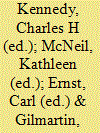

|
|
|
|
|
| Publication |
Karachi, Oxford University Press, 2003.
|
| Description |
xix, 390p.hbk
|
| Standard Number |
0195797760
|
|
|
|
|
|
|
|
|
|
|
|
Copies: C:1/I:0,R:0,Q:0
Circulation
| Accession# | Call# | Current Location | Status | Policy | Location |
| 047147 | 954.91/KEN 047147 | Main | On Shelf | General | |
|
|
|
|
| 16 |
ID:
119466
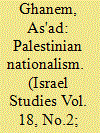

|
|
|
|
|
| Publication |
2013.
|
| Summary/Abstract |
A ccording to the literature there are two types of nationalism: First, Civic (territorial) nationalism emphasizes the common territory and citizenship as the criteria for individualsâ?? inclusion in the national group. 1 Here the national group is the totality of citizens, with no emphasis on their primordial ethnic affiliation; the national culture consists chiefly of civic and universal values. This kind of nationalism is found in France, Great Britain, and the United States. Civic nationalism crystallizes under the shadow of attempts to establish hegemony for the dominant group culture, values and basic beliefs.
|
|
|
|
|
|
|
|
|
|
|
|
|
|
|
|
| 17 |
ID:
138251
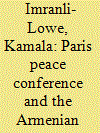

|
|
|
|
|
| Summary/Abstract |
The South Caucasus, which includes Armenia, Azerbaijan and Georgia, is one of the most challenging regions in the world, owing to its long-lasting and ongoing conflicts. One of these conflicts is between Armenia and Azerbaijan, the current stage of which has continued for 25 years without any prospect of a settlement in the near future. For a better understanding of this conflict it is necessary to go back to 1918 and 1919, which witnessed the emergence of the first Azerbaijan and Armenian Republics. The article examines and assesses the ethnic, historical, economic, geographical and security arguments submitted by the Armenian government to the Paris Peace Conference in 1919 to substantiate its vision of territorial delimitation between Armenia and Azerbaijan regarding Garabagh. The article argues that Armenian nationalism was ethnic nationalism and that the Armenian government constructed politically motivated arguments to substantiate its claims to Garabagh, which were part of its nationalist aim of constructing an Armenian ‘ethno-nation’ in the area from the Mediterranean to Garabagh.
|
|
|
|
|
|
|
|
|
|
|
|
|
|
|
|
| 18 |
ID:
132433
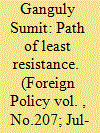

|
|
|
| 19 |
ID:
164511


|
|
|
|
|
| Summary/Abstract |
After the Greek veto on Macedonia’s NATO accession in 2008, the Macedonian government launched comprehensive policies to reconstruct the Macedonian ethno-national narrative as stretching back to ancient Macedonia. The ‘Skopje 2014’ project, which was a large-scale reconstruction of the capital city in neoclassical and baroque styles, as well as new educational and mass media campaigns claiming the continuous existence of the Macedonian nation since antiquity, were the cornerstones of the Gruevski government’s project. The so-called ‘antiquisation’ programme was both a domestic and international assertion of Macedonia’s name, identity and history amid Greek challenges and attempts to undermine Macedonia’s legitimacy in the eyes of the international community. The Skopje 2014 project increased tensions between ethnic Macedonians and Albanians in Macedonia, and also deepened divisions among Macedonians.
|
|
|
|
|
|
|
|
|
|
|
|
|
|
|
|
| 20 |
ID:
054858
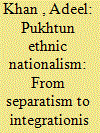

|
|
|
|
|
|
|
|